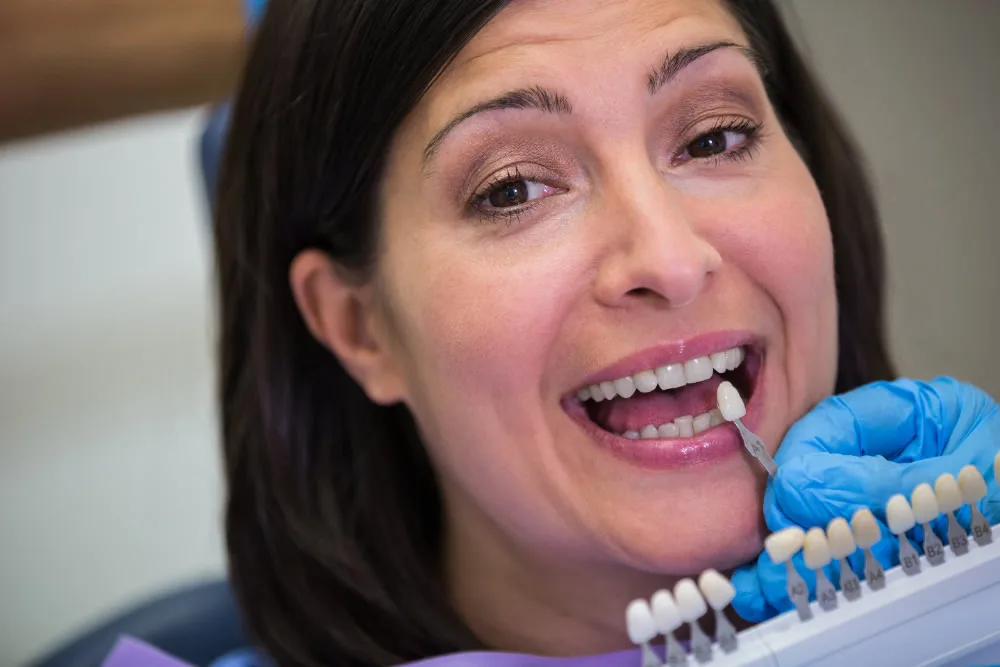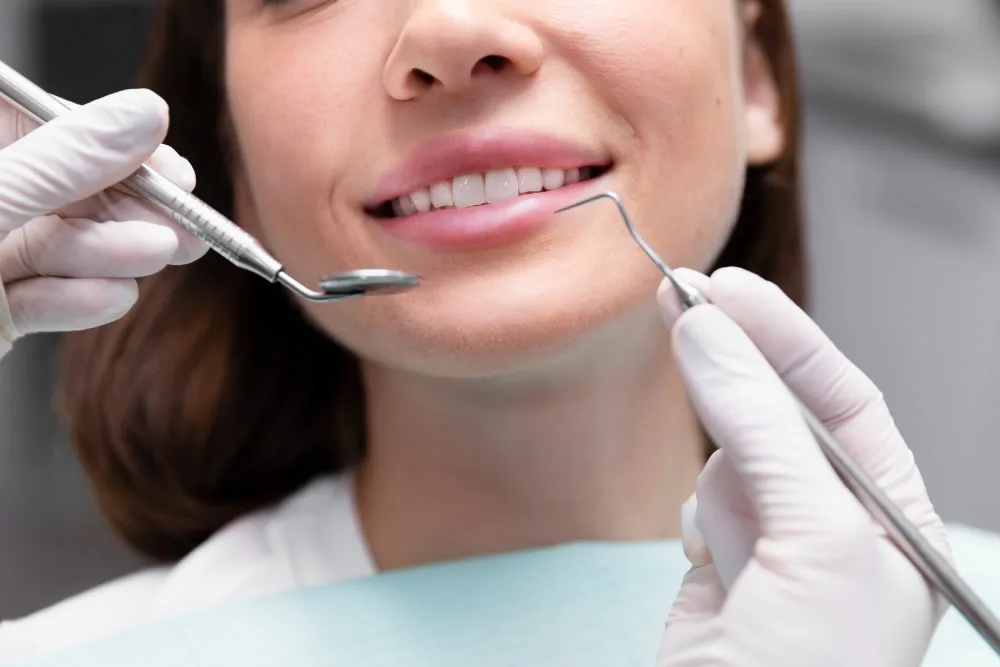
Zirconia crown has revolutionized the field of dental restorations. Following the metal-based porcelain crown technique, this innovative method offers a natural white appearance, making it a popular choice among patients dissatisfied with the look or color of their teeth. Besides addressing aesthetic concerns, zirconia crown is long-lasting, making them a durable solution. Another reason for their popularity is their optimal level of light translucency, which enhances their natural appearance.
Unlike some other methods, zirconium crown does not cause discoloration or a purplish tint on the gums. They are also highly biocompatible, meaning they integrate well with oral tissues without causing adverse reactions. Moreover, zirconium crown does not lead to sensitivity to hot or cold, an essential factor for ensuring a comfortable experience. This means they not only last a long time but also provide a superior level of comfort during use.
For those wondering, zirconium crown can also be placed over implants. This method is particularly suitable for individuals without gum disease, those seeking a more natural and aesthetically pleasing smile, and patients who have reached full developmental maturity. In this article, we will address all the details and questions related to zirconia crown. But first, let’s take a closer look at how the process works.
How Is Zirconia Crown Made?
Before starting the procedure, the patient must undergo a comprehensive examination. The dentist assesses whether there are any health issues related to the teeth or gums. If necessary, X-rays may also be taken. After evaluating all the results, if the patient is deemed a suitable candidate for zirconium crown, the procedure can begin.
The first step involves taking measurements of the patient’s teeth. These measurements are then used to prepare the crowns in a laboratory setting. While the process requires several sessions, it’s important to note that these sessions are not burdensome for the patient and do not significantly disrupt daily life. Temporary crowns are applied between sessions, ensuring patients experience no difficulties with functions such as eating or speaking. Additionally, patients have the opportunity to select the color of their crowns at this stage.
One common question about zirconia crown is how much the teeth are reduced. The process requires only about 1 mm of enamel to be removed, allowing the crown to adhere perfectly to the tooth surface. This minimal reduction ensures that the crowns fit securely and can be used without issues for a long time. In short, this reduction is necessary for the crowns to bond effectively and cover the entire surface of the tooth.
The procedure begins with the application of local anesthesia, ensuring that the patient does not feel any pain or discomfort during the tooth reduction process. The steps of the procedure are as follows:
- A thorough oral examination is conducted.
- Local anesthesia is applied, and a brief waiting period ensures its effect.
- The teeth to be treated are slightly reduced.
- Impressions are taken.
- Temporary crowns are placed on the teeth.
- The patient selects the color of the final crowns.
- Once prepared, the zirconia crown is placed on the teeth.
- Patients are advised to attend check-ups every six months.
In most cases, the crowns are not permanently bonded initially. This approach allows the patient to test the crowns for a period and report any issues. If the patient experiences discomfort or concerns, necessary adjustments are made. If no issues arise, the crowns are permanently bonded to the teeth, giving patients a chance to experience their zirconium crown beforehand.
Features of Zirconia Crown
Those researching dental crown techniques and materials often wonder about the characteristics of zirconium crown. It’s worth noting that this type of crown can be applied to both front and back teeth. The numerous advantages, especially their durability, make zirconia crown a popular choice.
Below are some key features of zirconium crown:
- They possess a robust structure due to undergoing a special firing process.
- They exhibit excellent resistance to cracking, breaking, and wear.
- They provide ideal protection against corrosion.
- Similar to natural tooth enamel, they allow light to pass through.
- This translucency gives the crowns a naturally white and aesthetic appearance.
- The material is compatible with the gums and does not contain metal.
- They offer a long service life.
- Reduced heat transmission prevents sensitivity to hot and cold.
- They do not create a metallic taste or alter the natural taste in the mouth.
- They do not cause dark discoloration on the gums.
- Compared to natural teeth, they are far less prone to staining.
- Since they are metal-free, they avoid allergic reactions often associated with metal.
- The crowns have a glossy and smooth surface.
Who Can Benefit from Zirconia Crown?

If you are not satisfied with the appearance of your teeth and have completed your developmental phase, zirconium crown may be a suitable option for you. This crown type is also ideal for those seeking an aesthetic smile. Below are situations where zirconia crown can be applied:
- Severe cavities, defects, or damage to the teeth.
- Excessive wear on the teeth.
- Gaps between teeth (diastema).
- Fractured teeth due to trauma.
- Tooth discoloration.
- Ineffective results from whitening treatments.
- Missing teeth requiring bridgework or crowns over implants.
- Misaligned teeth that cannot be corrected with orthodontic treatment.
- Previously crowned or bridged teeth.
- Unesthetic fillings in teeth.
- Gums receding, leading to compromised dental aesthetics.
Additionally, zirconia crown can be used as full crowns over implants in cases of multiple missing teeth.
Zirconia Crown Models and Longevity
Many patients wonder how long zirconia crown lasts. The answer largely depends on the patient. Some individuals can use their crowns for up to 10 years, particularly if they maintain proper oral hygiene and attend regular dental check-ups. However, neglecting oral and dental care can lead to issues, not because of the crown itself, but due to problems like tooth decay or gum disease.
It’s essential to note that zirconium crown does not protect teeth from decay. Maintaining oral hygiene, including thorough cleaning and care, is as crucial after the procedure as it was before. Failure to do so may result in various dental problems. Having zirconia crown does not guarantee immunity from tooth or gum issues.
Differences Between Zirconia Crown and Laminate Veneers
Patients often ask about the difference between zirconia crowns and laminate veneers. The distinction lies in the surfaces they cover. While zirconiumcrowns encase the entire tooth, laminate veneers are applied only to the front surface and do not wrap around the tooth. Laminate veneers are also applied individually to each tooth and require minimal trimming for application.
The difference between zirconium crowns and metal-supported crowns lies in the support material beneath the porcelain. Metal-supported crowns have a metal framework, while zirconia crowns are metal-free, eliminating the risk of allergic reactions to metal. Zirconiaumcrowns also integrate better with the gums, avoiding discoloration. In contrast, metal-supported crowns may not achieve the same gum compatibility and can sometimes lead to a purplish appearance around the gums.
Age Limit for Zirconia Crown
Zirconia crown is not recommended for individuals in their growth phase, as the jaw continues to develop during this time. If crowns are applied while the jaw is still growing, gaps can form over time. While there is no strict age limit, it is generally advised to wait until after 18-20 years of age when growth is complete. Once development is finalized, zirconia crown can be applied safely.
Does Zirconium Crown Stain?
With proper oral hygiene, zirconia crowns do not stain. However, habits like smoking, excessive consumption of tea or coffee, and neglecting dental care can lead to discoloration. In such cases, clinical whitening procedures can restore the crown’s original color.
Is Pain Experienced During or After Zirconium Crown Treatment?
Zirconium crown treatment involves the application of local anesthesia, which numbs the area. Therefore, no pain or discomfort is felt during the procedure. However, after the anesthesia wears off, some patients may experience mild pain in the treated area. The level of discomfort varies from person to person, and some patients report no pain at all. Therefore, pain and sensitivity can differ depending on the individual.
Can Zirconia Crowns Fall Off?
Zirconia crowns are fixed to the tooth using a special adhesive material, making the likelihood of them falling off extremely low. The only situation where this may happen is if the tooth experiences a very hard impact. Otherwise, normal functions such as eating and speaking will not cause the crown to loosen or fall off.
Zirconia Crown Prices

Zirconia crown prices can vary widely, and this is completely normal due to various factors that influence the cost. Some of the factors that affect the pricing include:
- The materials used by the dentist
- The quality level of these materials
- The experience of the dentist
- The equipment used during the procedure
- Which teeth are being treated
- The number of crowns being applied
- Whether additional treatments, such as cavity treatment, are required
Additionally, exchange rates play a role in pricing since many of the materials used in zirconium crown are imported. As a result, fluctuations in exchange rates can affect the overall cost. When researching the prices for zirconia crown in 2024, you may notice a wide range of prices due to these various factors.
Can Zirconia Crown Be Applied to Front Teeth?
Yes, zirconia crown can be applied to front teeth as well. However, it is recommended to consult with your dentist about the best approach for your case. Many patients opt for full ceramic crowns or laminate veneer crowns for their front teeth. Your dentist will provide more detailed guidance regarding the most suitable option for you.
Who Should Not Receive Zirconia Crown Treatment?
Although zirconia crowns are suitable for a wide range of patients, there are some cases where the procedure is not recommended:
- Individuals under the age of 18 who have not completed their growth
- People with misaligned or distorted jaw structures
- Patients who need other treatments before receiving a crown (In such cases, zirconia crowns may be delayed)
- Those who do not maintain proper oral hygiene or have inconsistent hygiene habits may face complications. It’s crucial to pay maximum attention to oral hygiene after the application of zirconia crowns.
Feel free to ask any further questions you may have about zirconia crowns in the comment section.
What Are the Advantages of Zirconia Crowns?
Zirconia crown is the preferred treatment option for teeth with excessive material loss or when other aesthetic treatments are not applicable. Due to their high light translucency and white color, zirconia crown offers far better aesthetic results compared to traditional metal-supported crowns. They are also more durable against chewing forces than full porcelain crowns, making them suitable for a wider range of applications.
Additionally, zirconia crown provides better compatibility with the gums compared to metal-supported porcelain crowns and do not create undesirable color differences at the gum line.
In some cases, traditional metal-supported porcelain crowns may lead to allergic reactions due to the chrome alloys used in their infrastructure. Zirconia crown offers an advantage in such cases as they are free from these allergenic materials.
What Are Zirconia Crowns Used For?
Zirconia crowns are applied in various dental situations, including:
- When traditional metal-supported porcelain crowns do not provide sufficient aesthetics, zirconia crowns can be applied to front teeth.
- Zirconia crown is used in areas where completely porcelain crowns are avoided, especially when the chewing force is higher.
- If a tooth has experienced significant material loss, such as from large cavities or fractures due to trauma, zirconia crowns can restore the tooth.
- Zirconia can be used as a base for dental bridges to replace missing teeth.
- For patients who do not wish to undergo orthodontic treatment, zirconia crown can be applied to correct dental misalignments.
- Zirconia crown can be used for implant-supported prosthetics.
- In cases of tooth wear caused by grinding or clenching, zirconia crowns can be used to restore the original bite height.
- For teeth with aesthetic shortcomings or structural defects due to genetic factors, zirconia crown can improve both appearance and function.
Who Can Receive Zirconia Crown Treatment?
Zirconia crown can be applied to anyone whose jaw and dental development is complete. They are used as needed based on the individual’s dental condition.
How Long Does Zirconia Crown Treatment Take?
The duration of zirconia crown treatment depends on the condition of the teeth and the number of teeth being treated. Treatment can take anywhere from 1 to 5 days, depending on the specific case and the expertise of the dentist.
What Should Be Taken into Account in Zirconia Crown Treatment?
In zirconia crowns designed as bridges, food particles may accumulate under the body part, which covers the missing teeth, and this can lead to bad breath and discomfort. Therefore, the areas under the body parts should be cleaned with special brushes and floss. Similarly, in other zirconia crowns, it is important that no buildup occurs at the point where the crown meets the tooth, and these areas should be cleaned properly. If food accumulations cannot be cleaned, a dentist’s checkup is recommended.
People with zirconia crown should pay particular attention to their gum health. Gum diseases over time may cause gum recession, which will reduce the lifespan of the zirconia crowns. Therefore, maintaining good oral hygiene is crucial.
Teeth grinding and clenching problems can also lead to gum recession. Individuals with these habits are advised to take preventive measures, such as using a night guard.
If there are stains on existing teeth and whitening treatments are planned, these treatments should be carried out before the zirconia crowns are applied, as whitening agents do not affect the crowns.
Porcelain surfaces on zirconia do not stain easily. However, coloring foods like tea and coffee can cause slight staining. Therefore, it is recommended to avoid excessive consumption of these substances.
Annual dental checkups are also important for the health and longevity of zirconia crown.
It may interest you –> Hollywood Smile Turkey
Is Zirconia Crown Safe and Durable?
Zirconia crown is highly durable when applied correctly. With good oral hygiene and careful use, they can last for many years. The combination of durability and aesthetics is one of the standout features of zirconia crowns.
Dental Group Hospitadent, with its expert and qualified team, serves to give you a more beautiful and healthy smile in all of its branches, using the latest technology. You can visit Dental Group Hospitadent branches for all your treatments, including zirconia crowns, in a comfortable and professional environment.
You can check it out –> Dental Care İstanbul
Why Choose a Zirconia Crown in Turkey?
Turkey is an excellent choice for a zirconia crown for several reasons:
- Cost-effective options: Dental procedures like a zirconia crown in Turkey are much more affordable compared to Western Europe and the United States. This is due to the lower cost of living, tax policies, and favorable exchange rates. Even when factoring in travel and accommodation, you can still save a significant amount of money by opting for treatment in Turkey.
- Top-quality care: Turkish dentists are highly trained and skilled, with many having studied and worked in Europe or the United States. This ensures that you receive exceptional care from professionals proficient in the latest dental techniques and technology.
- Advanced facilities: Turkey boasts numerous modern dental clinics, equipped with the latest technology and high standards of hygiene and safety. This ensures a comfortable and secure experience for patients.
- Personalized treatment: Many dental clinics in Turkey offer tailored care, with multilingual staff to facilitate smooth communication. This ensures a stress-free experience as you discuss your needs and concerns.
- Shorter waiting times: Compared to many other countries, Turkey offers quicker appointment availability, allowing you to receive timely and efficient dental care.
- Cultural experience: While receiving top-tier dental care, you can also enjoy Turkey’s rich culture, history, and stunning landscapes. With ancient landmarks, beautiful beaches, and vibrant cities, Turkey offers a variety of experiences for every traveler.
for your information –> Antalya Dental Clinic
Outer reference:
https://www.healthline.com/health/what-you-need-to-know-about-dental-crowns-made-from-zirconia
